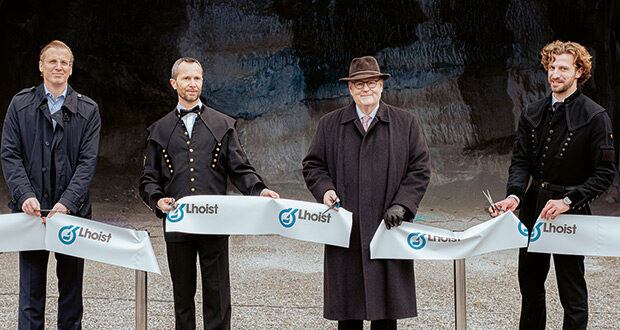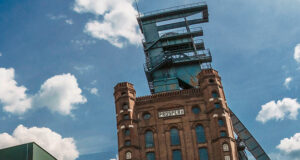“With the experimental mine, we as Lhoist Germany are starting an ambitious experiment for the Lhoist Group in Europe,” explained Thomas Perterer, Managing Director of Lhoist Germany, Wülfrath. For the first time in North Rhine-Westphalia, otherwise inaccessible deposit areas are to be developed on an industrial scale and with the most modern extraction technology. The project is initially planned for three years. During this period, a total of 1.5 Mt of limestone are to be extracted underground. By way of comparison: Lhoist extracts about 7.5 Mt of usable limestone annually from the two active quarries Rohdenhaus and Silberberg at the site.
Underground extraction is a novelty for the company. In the industry, limestone is usually extracted above ground in quarries. Whether the new extraction method is economically viable and can be carried out at reasonable expense is now to be shown by the operation of the test mine. Managing Director Perterer: “By tapping domestic raw material deposits in an innovative way and exploiting them in the best possible way, we are making an important contribution to industrial transformation. After all, lime products are and will remain a fundamental component of numerous industrial value chains, including for the energy transition, digitalisation or housing construction.”
With the mine, Lhoist wants to open up previously inaccessible deposit sections, relieve the pressure on the main surface quarry operations and extend the life of the site. The underground operation should also lead to a reduction in noise and dust emissions and thus contribute to the plant’s continued high acceptance in the region. If the trial operation successfully proves that limestone can be economically extracted underground, Lhoist probably intends to apply for regular operation after the temporary approval expires.
After extensive exploration of the deposit in Wülfrath – hundreds of core drillings with a total length of almost 100 km have been carried out since the 1950s – those areas that are not suitable for surface mining have recently been examined more closely. The eastern part of the Rohdenhaus quarry proved to be a suitable field for the experimental mine. There are still several million tonnes of limestone here but they could not be extracted because of the district road above it between Wülfrath and Velbert.
Until now. For with the three portals that Lhoist has driven into the rock about 160 m below the county road, the first steps have been taken to develop the valuable limestone. The company intends to start regular mining operations in 2023. The limestone will then be loosened from the rock mass by means of drilling and blasting and transported away by vehicles for further processing. Similar to tunnel construction, the tunnels are driven horizontally into the rock. In the process, pillars are left in place at regular intervals to support the resulting vault.
Plant manager and host Gabor Lang welcomed the guests to the ceremony and spoke in his speech about the historical significance of this day: “A good 120 years after the foundation of the Flandersbach plant by August Thyssen, we are today experiencing a historic moment for our plant and our company at this important location,” said Lang. In his speech, Lhoist Germany Managing Director Thomas Perterer placed particular emphasis on the aspect of securing raw materials: “For the reliable supply of lime products to industry, access to existing raw material reserves is the basis and starting point of everything. Therefore, we are proud to embark on a new path of securing raw materials today and thus also set an example throughout the industry.” Immediately in front of the portals of the mine in the quarry, Dorian Kunert, head of extraction at the site in Flandersbach, explained the characteristics of the new mine and the special challenges of underground extraction.
Perterer, Lang and Kunert symbolically cut the ribbon to open the mine together with Joachim Rumstadt, Chairman of the Supervisory Board of Lhoist Germany (Figure 1). (Lhoist/Si.)

